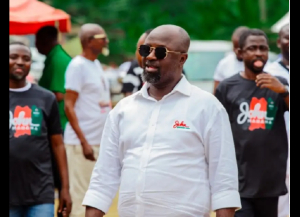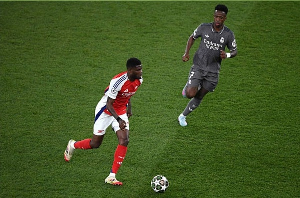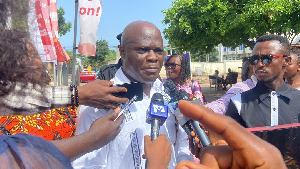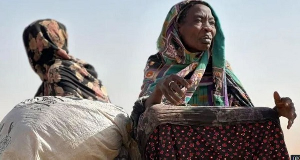By K. Badu
It is quite bizarre that President Mahama does not seem to be fretted over the numerous bribery and corruption allegations that have been levelled against him.
Apparently, the idiosyncratic allegations include, inter alia, ‘the furtive gift (the Ford Expedition)by the Burkinabe Contractor, Djibril Kanazoe; the Embraer 190 scandal; Armajaro; the STX Housing deal ; SADA; SUBA Info Solutions scandal’ and many others.
Obviously, President Mahama and his NDC government corrupt practices have resulted in excessive public spending, less efficient tax system , needless high public deficit and destabilization of national budgets, heightened capital flight and the creation of perverse incentives that stimulate income-seeking rather than productive activities (‘create, loot and share’-apologies to JSC Dotse).
"When public money is stolen for private gain, it means fewer resources to build schools, hospitals, roads and water treatment facilities. When foreign aid is diverted into private bank accounts, major infrastructure projects come to a halt. Corruption enables fake or substandard medicines to be dumped on the market, and hazardous waste to be dumped in landfill sites and in oceans. The vulnerable suffer first and worst (Ban Ki-moon, 2009)."
The fact of the matter is that corruption impedes economic development by distorting markets and collapsing private sector integrity.
“Corruption also strikes at the heart of democracy by corroding rule of law, democratic institutions and public trust in leaders. For the poor, women and minorities, corruption means even less access to jobs, justice or any fair and equal opportunity” (UNDP 2016).
A few examples of gargantuan negative effects of corruption on society are:
“• $1,000 billion are paid in bribes per year (source: The World Bank Institute) “• Corruption can cost a country up to 17 Percent of its GDP (source: Asian Development Bank) “• US$1.8 trillion is the volume of illicit financial flows from Africa between 1970 and 2008: (source: Global Financial Integrity, 2010).
What exactly is corruption?
“Corruption is the misuse of public power (by elected politician or appointed civil servant) for private gain.
“Corruption is the misuse of entrusted power (by heritage, education, marriage, election, appointment or whatever else) for private gain”.
How are “offering”, “promising” and “giving” a bribe treated under the law?
In fact, different countries have different responses to these questions, by definition as well as interpretation.
In some jurisdictions, for instance, the courts may consider an oral offer of a bribe not as attempted bribery, unless the briber takes further steps.
An OECD report, however, suggests that broad definitions of corruption may be one reason why prosecutions are so low.
Apparently, the OECD, the Council of Europe and the UN conventions do not explicitly define “corruption””, but have establish a range of corrupt offences.
For example, the OECD Convention establishes the offence of bribery of foreign public officials, while the Council of Europe adds trading in influence and bribing domestic public officials as well.
Besides, the UN Convention covers embezzlement, misappropriation of property and obstruction of justice.
In fact, one mostly-cited mystery is distinguishing illegal trading in influence from legal lobbying.
“The Council of Europe Convention criminalises trading of “improper influence”, i.e., there must be corrupt intent.
“The UN Convention only covers peddlers who “abuse” their influence. The OECD glossary notes that international definitions of corruption for policy purposes are common, and cites “abuse of public or private office for personal gain” as a useful example for policy development” (OECD 2007).
Does Armajaro scandal merit improper lobbying?
If you may recall, somewhere in October 2010, the British media brought up sensational reports about how the then Vice President John Dramani Mahama, was lobbied by a British Cabinet Minister to get a reprieve for the ban imposed on Armajaro Holdings, one of the cocoa buying companies who were found guilty for smuggling the commodity out of Ghana.
It would be recalled that Armajaro Company was banned together with a few other companies, when the award winning investigative journalist, Anas Aremeyaw Anas exposed the smuggling of uncountable bags of cocoa into neighbouring Cote d’Ivoire.
Shockingly, however, the British media reported that subsequent to the meeting between the then Vice President John Dramani Mahama and the British Cabinet Minister, Armajaro Company was given a needless reprieve and then started its operations.
What about the STX Housing deal?
As a matter of fact, the manner in which the then Vice President Mahama handled the STX Housing deal leaves much to be desired.
Although the deal did not see the light, the then Vice President Mahama, gave us a bill of an excess of $250 million. How bizarre?
Besides, after the failed deal with STX to build 30,000 housing units for the nation's security agencies, the NDC government entered into another deal with the GUMA Group, for the construction of 500 housing units.
The deal which was championed by President Mahama was widely criticised by various stakeholders, just as the STX deal, following the decision to side-line local construction firms in favour of the foreign company. The unusually high cost of the project was also a source of concern to many.
Does the Burkinabe Contractor Djibril Kanazoe’s furtive gift to President Mahhhhama also constitute a bribe?
In all honesty, the most recent investigative work carried out by the award winning investigative journalist, Joy FM’s Manasseh Azuri exposed President Mahama’s surreptitious gift of a brand new Ford Expedition vehicle, worth over $100,000 by the Burkinabe Contractor, Djibril Kanazoe.
It is on record that the Burkinabe Contractor Kanazoe has executed a number of contracts, which were secured through sole-sourcing and handpicking, amid allegations of president Mahama’s influence.
According to Manasseh’s report, Djibril Kanazoe had been previously bidding for contracts in the country over the years; however he was not successful until a middleman led him to meet then Vice President Mahama.
Subsequent to meeting the then Vice President Mahama, Kanazoe was handpicked to build the $650,000 Ghana Embassy fence wall in Burkina Faso.
If you may recall, in September 2014, when officials of the Bank of Ghana met the Public Accounts Committee of Ghana Parliament (PAC), it came to light that an amount of $656, 246.48 had been spent on the construction of a fence wall over a parcel of land belonging to the Ghana Embassy in Burkina Faso.
Apparently, PAC requested the Bank of Ghana to look into what it referred to as: “the outrageous” cost of the project.
However, it came to light that the procurement process was violated to the advantage of President Mahama’s Burkinabe friend.
Shockingly, during an interview with Manasseh, Djibril Kanazoe admitted that he did not put in a bid for the contract, however, the Ghana Embassy in Ouagadougou wrote to his company to request price quotations for the project. He however forwarded the necessary quotes and was selected.
“Subsequently, the Burkinabe contractor delivered to President Mahama, the ‘gift’ of a brand new Ford Expedition vehicle in 2012, the same year his company was selected, again through sole-sourcing, to execute more projects” (See: ‘Burkinabe Contractor offers controversial gift to President Mahama’ ; myjoyonline.com, 15/06/2015).
Has President Mahama also been involving in favouritism, cronyism and nepotism?
In terms of meanings, favouritism, nepotism and cronyism all involve abuses of discretion. Even though some countries do not criminalise the conduct, (Article 7 of the UN Convention against Corruption covers merit selection without even mentioning nepotism).
Those violations usually involve not a direct personal benefit to an official but promote the interests of those related to the official, whether through family, political party, tribe, or religious group.
In fact, a fantastically corrupt official who hires a relative (nepotism) or a friend (cronyism), does so, in exchange, not often of a bribe but of the less tangible benefit of advancing the interests of others connected to the official.
Actually, the unlawful favouring of - or discrimination against - individuals can be based on a wide range of group characteristics: tribe, religion, geographical factors, political or as well as personal or organizational relationships, such as friendship or shared membership of clubs or associations.
If anything at all, discerning Ghanaians must be mindful and desist from giving President Mahama another chance in the forthcoming general elections.
References:
OECD (2007), Defining corruption: Glossary of International Standards for Criminalisation of Corruption, ISBN 9789264027404, OECD Observer. (www.oecd.org).
UN (2005), The UN Convention against Corruption.
www.undp.org
www.myjoyonline.com
Opinions of Wednesday, 12 October 2016
Columnist: Badu, K
Mahama and the bizarre bribery and corruption cases (2)
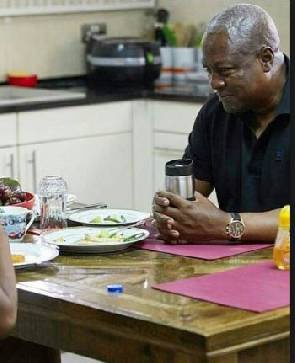 President John Mahama
President John Mahama


